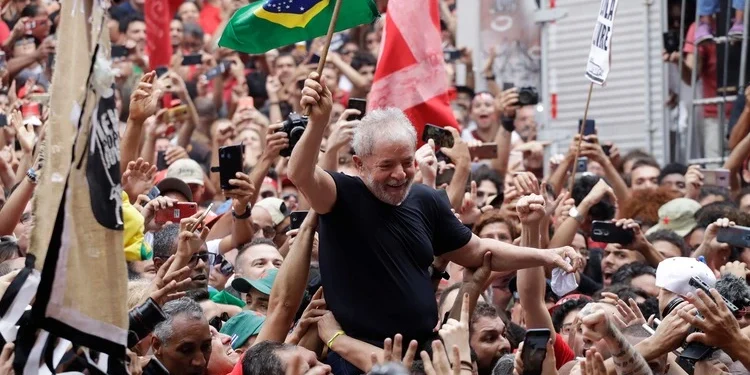The rollercoaster ride of Brazilian politics, both home and abroad, is far from over despite former president Lula regaining power. Image: Nelson Antoine/Shutterstock
Katie Burton reports on the complex challenges facing South America’s largest country, Brazil, in a rapidly changing world
The world’s fourth-largest democracy has had a turbulent decade. In 2016, thirteen years of left-leaning rule under the Workers’ Party came to a bruising end. Then-president Dilma Rousseff was impeached for breaking budget laws, while former- president Lula, once described by Barrack Obama as the ‘world’s most popular president’, was later imprisoned for corruption.
Then, in 2018, came the election of Jair Bolsonaro, a right-wing provocateur. Since then, the political pendulum has swung once more. Luiz Inácio Lula da Silva (called Lula in Brazil), an ex-union leader and giant of the Brazilian left, returned to the presidency in January 2023, having been released from prison with the corruption charges against him dropped on procedural grounds.
Enjoying this article? Check out our related reads:
He returned to power after what was later described by a congressional inquiry as ‘a wilful and premeditated coup attempt’, engineered by Bolsonaro and perpetuated by his supporters.
However, it seems unlikely that Lula will be able to replicate the success of his former time in office. The eight years from 2003 to 2011, during which Lula previously held power, were, in many ways, a charmed time. With China scooping up Brazil’s raw materials to fuel its own economic miracle, Lula was able to pump billions of dollars into progressive social programmes.
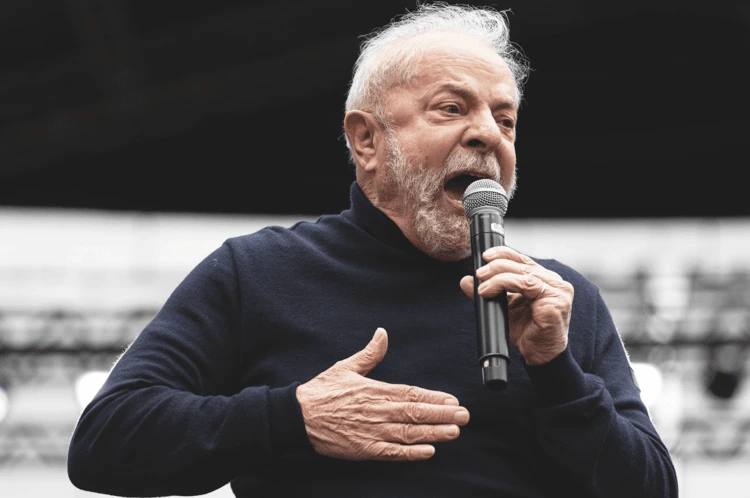 Lula during the presidential campaign in São Paulo in 2022. Image: Isaac Fontana/Shutterstock
Lula during the presidential campaign in São Paulo in 2022. Image: Isaac Fontana/Shutterstock
By increasing the minimum wage well above the rate of inflation and by broadening state help with his widely lauded Bolsa Familia programme, he improved the lives of millions of Brazil’s poorest residents. But, 2024 is not 2011.
Today, President Lula faces a very different world. Brazil’s economic fate is dependent on global demand for its main exports and one of its key lifelines – the sale of iron ore to China – is declining as China’s housing boom slows. With world demand for oil also falling, an increase in energy imports, and a decline in the competitiveness of other Brazilian products, the money isn’t there for the sorts of programmes that made Lula’s name.
Equally as problematic for Lula is the fact that he is hampered by the make-up of Brazil’s Congress, where he now has a smaller share of seats than during his previous terms. Having won in 2023 with a majority of just 50.9 per cent (versus Bolsonaro’s 49.1 per cent), he is in a weak position.
A full charge ahead with left-wing policies is neither possible nor wise. Brazil remains politically polarised; its swing to the far right has had a lasting impact.
The Bolsonaro Effect
For his four years in power, Bolsonaro, a retired military officer, led Brazil with a purported focus on ‘God, Homeland and Family’ and a lot of talk about anti-corruption. In reality, according to Monica de Bolle, a senior fellow at the Peterson Institute for International Economics, he had few concrete policies.
‘Bolsonaro couldn’t care less about policy. He just wanted to do pretty much what Trump was doing. He wanted to Tweet. He went to create chaos. He wanted to bang on about stuff, make noise.’
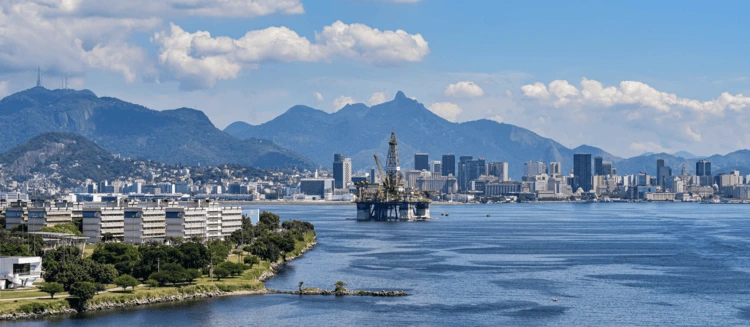 An oil exploration platform in Guanbara Bay, Rio de Janeiro. Brazil is currently the world’s seventh largest oil producer and is expected to become the fourth largest this decade. Image: Renato Meireles/Adobe Stock
An oil exploration platform in Guanbara Bay, Rio de Janeiro. Brazil is currently the world’s seventh largest oil producer and is expected to become the fourth largest this decade. Image: Renato Meireles/Adobe Stock
What’s clear is that his regime resulted in a situation which Amnesty International called: ‘nothing less than disastrous for human rights.’ By December 2023, the National Ombudsperson of Human Rights’ Office had registered more than 3.4 million allegations of human rights violations in Brazil, including racism, physical and psychological violence and sexual harassment.
This was an increase of 41 per cent compared with 2022. Andreza Aruska de Souza Santos, director of King’s College’s Brazil Institute, says that the impact of these years is still observable in wider societal change in Brazil – something that makes a full reversal of Bolsonarismo (as the leader’s brand of right-wing extremism became known) difficult for Lula.
‘Brazil is a lot more conservative now, and people did not necessarily vote for Lula for advancement on abortion or gay marriage, for example. In fact, there has been a lot of back-peddling on issues that Brazil famously advanced, with labour politicians taking the lead,’ she says.
Bolsonaro’s regime has been called ‘nothing less than disastrous for human rights’ according to Amnesty International. Video: TRTWorld
‘It’s almost as if all conservatives left the closet. Things that would once have been very unpopular to say: for example, “I am anti racial-quotas” [Brazilian universities must obey minimum percentages of black, multiracial, and Indigenous applicants], are now becoming more common opinions. This is making it more difficult for the left to advance on these rights.’
It’s a conservative swing visible all over the world, and part of a wider trend in Latin America. As the 21st century progressed, Brazil was a key component of a Latin American movement known as the ‘Pink Tide’ – a turn towards left-wing governments and, in some countries, more socially progressive and liberal policies (along with Lula in Brazil, the tide was characterised by Hugo Chavez in Venezuela and Evo Morales in Bolivia).
But, by 2010, the tide was once again receding and, in Brazil, Bolsonaro epitomised this.
De Souza Santos believes that Bolsonaro’s election success was an unintended consequence of Brazil’s economic growth in the early 2000s. (This is a story you hear more than once regarding Brazil – the country as a victim of past success.)
While the country’s growth clearly benefited millions of poorer people through the expansion of the welfare system, De Souza Santos says that the middle classes, some of whom were used to employing maids and other domestic servants, found their lifestyles less amenable and therefore came to feel that they had lost out. In addition, she notes that poorer people, who might naturally be assumed to side with Lula on economic issues, ‘do not always prioritise the economy. For a lot of people, cultural values, family and religion will come first.’
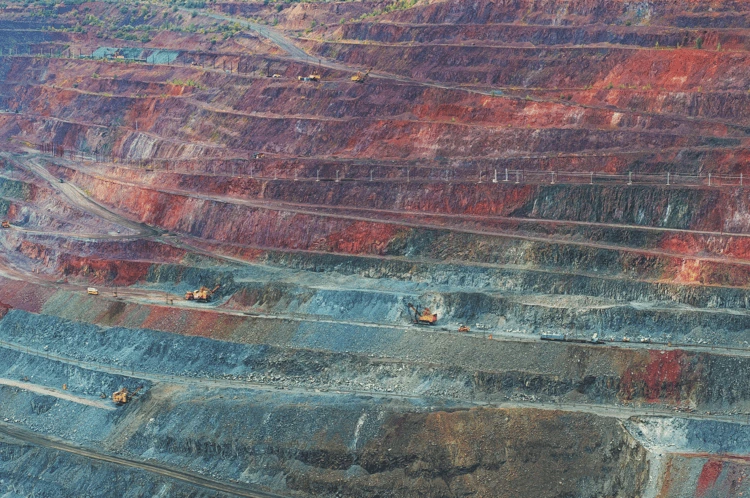 A vast open cast iron ore mine in Itabirito, Minas Gerais. Brazil is the world’s second largest iron ore exporter. Image: Tr Stok/Shutterstock
A vast open cast iron ore mine in Itabirito, Minas Gerais. Brazil is the world’s second largest iron ore exporter. Image: Tr Stok/Shutterstock
She adds that fake news and social media in Brazil are a huge factor in this. ‘People perceive the giving of rights as rights being taken away. For example, a right
to abortion is perceived as against the family. Or, if you allow gay marriage, you are against heterosexual couples. People will not necessarily vote with their memory,
but with the fear of other rights and cultural issues being taken away from them.’
The result of all this, she concludes, is that even politicians famously on the left, have shifted to the centre.
‘This pause on the extreme right is not the same as an advancement of the left.’ Lula and many of his supporters might be liberal-minded, but ‘there is no space in Brazilian society now to put those issues politically; it has just become a lot more conservative.’
Lula and global hunger
When it comes to foreign policy, Lula appears to be on the safest ground when he focuses on those issues he’s most well-known for tackling.
At the 2024 G20 meeting in Rio De Janeiro, Lula launched the Global Alliance Against Hunger and Poverty, a new initiative that aims to eradicate hunger and poverty. The Alliance is designed to focus on supporting national public policies such as school meals, cash transfers or water storage schemes, something which distinguishes it from many other development assistance models.
The director of the UN Food and Agriculture Organization (FAO) praised Lula for prioritising food security on the G20 agenda.
According to the FAO, global levels of hunger and food security have remained at broadly the same high levels for the past three years. More than 730 million people worldwide faced hunger in 2023, and more than 2.3 billion were moderately or severely food insecure.
Brazil and the wider world
Lula returned to power promising to focus on economic growth and job creation while promoting gender equality, social inclusion, and environmental sustainability. Given the country’s economic woes and rightward swing, he faces an uphill battle on these issues (though he has revamped his famous Bolsa Familia programme and has had some success reforming the country’s bloated tax system).
His other big priority – repairing and boosting Brazil’s reputation on the world stage – has also faced some setbacks.
Bolsonaro had few clear foreign policy goals and largely focused on aligning himself with other right-wing leaders, such as Donald Trump. This stance, coupled with his brazen anti- environmentalism, sparked widespread condemnation; awkward footage of a lonesome Bolsonaro wandering the G20 summit of 2021 seemed to confirm his position, and that of his country, as a global pariah.
Lula hopes to reverse this and, during his first year back in office, he visited more countries than Bolsonaro did in his entire four-year term. Brazil has presided over the G20 throughout 2024 and will host the COP30 climate conference in 2025, all of which present opportunities for advancement. Nevertheless, Brazil’s position on the world stage is a somewhat awkward one.
Having historically maintained a non-aligned, non-interference position in global conflicts, with an emphasis on respect for international law, Brazil now finds itself in a world of increased conflict, where such a stance is unwelcome. Lula has shown enthusiasm for playing a mediating role in global conflicts, but he has had little impact in this space.
Rather, his attempt at middle-power neutrality has provoked a certain amount of anger. Pushing for a ‘negotiated settlement’ between Kyiv and Moscow for example, or calling for the USA and its European allies to stop supplying arms to Ukraine has not been received well, to say the least.
‘Neutrality angers people big time,’ says De Bolle. ‘They want to see a stake in a position.’
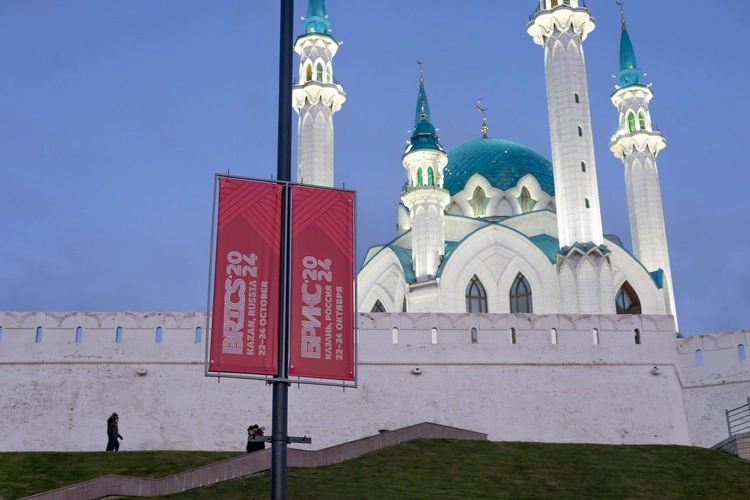 Lula has expressed his support for BRICS, of which Brazil is a member. Image: Irzhanova Asel/Shutterstock
Lula has expressed his support for BRICS, of which Brazil is a member. Image: Irzhanova Asel/Shutterstock
Elsewhere, Lula is keen to continue his long-term project of positioning Brazil as a leader of the Global South. During his previous administration, he was an outspoken proponent of policies to better support developing countries, calling for the revamping of international financial institutions to support more sustainable development goals. He was also a key supporter of the loose amalgamation of countries known as the BRICS, designed as an alternative to traditional Western power blocs.
During the Bolsonaro years, Brazil pulled back from the BRICS, in large part because Bolsonaro’s position on China was aligned with that of Donald Trump, who saw the country more as enemy than ally. Lula has again reversed this.
‘Now again, we have this BRICS endorsement by Lula,’ says Elena Lazarou, acting head of the External Policies Unit of the European Parliamentary Research Service and a fellow at Chatham House.
‘We’re again in a place where Brazil is engaging with Russia, engaging with China, and definitely with South Africa and India and the new BRICS members [in October 2024, the BRICS announced the inclusion of four new members: Egypt, Ethiopia, Iran, and the United Arab Emirates.] In Bolsonaro, we saw a huge shift towards alignment with the United States, and to a lesser degree with European countries. Now I think Lula is, to a degree, reversing that. We’ve seen how that has created some tension, especially with regard to his positions on Ukraine, but also on the Middle East.’
It highlights a wider question that Brazil has not fully answered. ‘There is an identity issue in Brazilian foreign policy,’ says Lazarou. ‘Is Brazil part of the Western world, or is it part of the Developing/Global South world? Or are these distinctions not necessarily mutually exclusive?’
‘It has been challenging for Lula to navigate this world compared to the one he faced 20 years ago,’ agrees De Bolle. ‘Geopolitical problems are way more serious
than they were back then. We know that a polarity is being constructed. You have a world that is still US- centric, and another part of the world that’s becoming increasingly China-centric, and that’s a big challenge for a country like Brazil, because Brazil is neither.’
‘What Lula is trying to do is the same thing that he tried to do in his first and second mandate, which is stay friends with everyone. But of course, the world is very different.’
Environmental pay-offs
The Bolsonaro years were disastrous for Brazil’s environmental policies and the health of the Amazon, the world’s largest tropical rainforest. Despite a global outcry, deforestation increased 75 per cent per year on average during his time in power. He actively promoted mining in Indigenous lands and there were 305 reported cases of Indigenous land invasion in 2021 – a 180-per cent rise from 2018, according to official data.
With a track record of prioritising environmental policies, much was expected of Lula on re-taking power, and there have been some key reversals of Bolsonaro-era policies, particularly with regards to the funding of agencies and the reinstatement of monitoring and accountability programmes.
He has decreed ten new Indigenous reserves and his first measure after swearing in was to create an Indigenous Affairs Ministry for the first time in Brazilian history, headed by an Indigenous woman, Sonia Guajajara. He has also promised to ‘aim for zero deforestation’.
But in Brazil – a country dependent on its extractive industries – being pro-environment is not a straight-forward proposition.
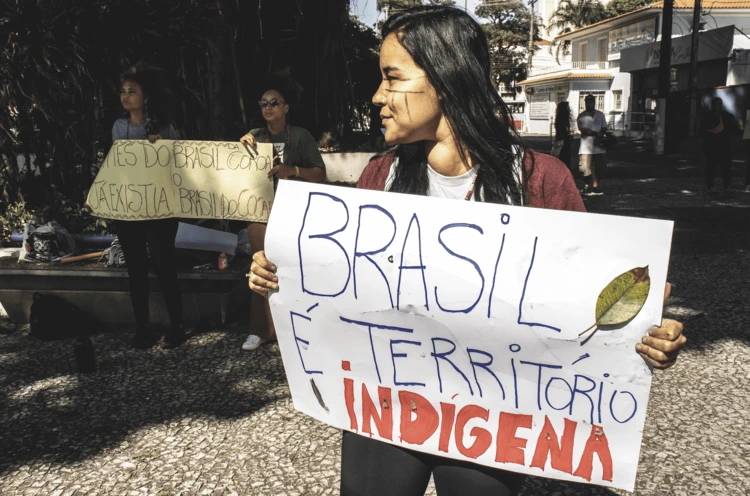 Indigenous people protesting against the controversial Marco Temporal laws which limit their land claims, 2023, Marilia. Image: Alf Ribeiro/Shutterstock
Indigenous people protesting against the controversial Marco Temporal laws which limit their land claims, 2023, Marilia. Image: Alf Ribeiro/Shutterstock
Complications and inconsistencies remain, one of the biggest being that Brazil is seeking to massively boost oil production over the next five years. The country is already a significant oil producer; in 2022 it was the ninth largest in the world and the largest in Latin America.
Now, the state-owned oil company Petrobras has started several new projects and is pushing to drill in the Equatorial Margin, an offshore area near the mouth of the Amazon river, referred to by the company as ‘a new offshore frontier’. Brazil’s environmental protection agency, Ibama, is due to decide by the end of the year whether to grant Petrobras permission to fully explore the area.
Many politicians, with an eye on Brazil’s economic health, are in favour. After all, the Equatorial Margin abuts Ampara, one of Brazil’s poorest states, where half the residents live in poverty.
COP30
The 2025 UN Climate Change Conference – COP30 – will convene in November 2025 in Brazil. Lula will likely make an enthusiastic head of the conference, though only if his health holds up (in October 2024, he had to cancel his trip to the COP16 UN biodiversity summit in Colombia on medical advice).
There is however, a lot of work for the world at large to do. The United Nations Framework Convention on Climate Change (UNFCCC) has warned that global climate action plans are ‘falling miles short’ of what is needed to stop climate change from ‘crippling’ economies. Current national climate plans submitted to the
UN should be enough to cut global greenhouse gas emissions by 2.6% from 2019 to 2030.
This neatly sums up one of Lula’s, and all of Brazil’s, biggest dilemmas. Simply put, the country’s entire economic model contradicts the protection of the Amazon and a focus on climate change. (Its second-most populous state, Minas Gerais, literally means ‘general mines’). ‘Brazil’s economic growth during the early 2000s was due to China’s economic miracle and the export of commodities, and it still is,’ says De Souza Santos.
‘This is a model of growth that contradicts a lot with Green Capital [the notion of making money from preserving natural spaces rather than utilising them for industry], because obviously we’re talking about mining, we’re talking about agribusiness, we are talking about oil.’
According to De Bolle, this dependence on commodity exports is something Lula would ideally like to change. He has always envisioned Brazil developing more manufacturing potential. But such a shift is especially hard to achieve today because it runs up against one of Brazil’s most fearsome lobby groups: agribusiness.
‘Leaving Mexico out, Brazil really is the one country in the region that has the capacity to have manufacturing and actually export manufacturing [something it does do but on a very small scale],’ says De Bolle.
‘But the agribusiness sector in Brazil has grown so massively economically and politically, that they currently have the ability to lobby hard, which leaves the government very little room to advance any policies that would benefit the manufacturing sector.’
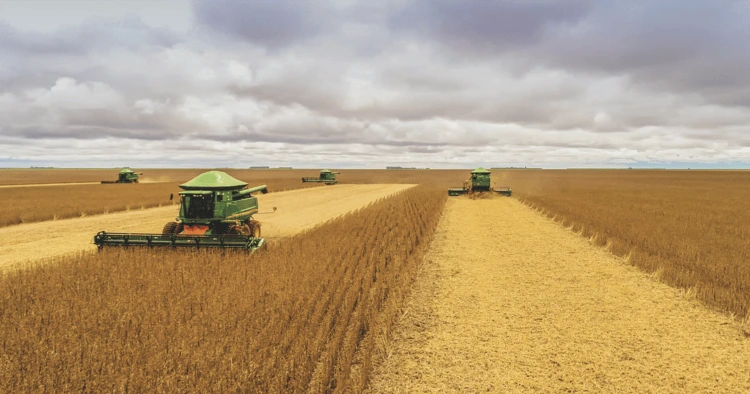 Brazil’s’ economic model butts heads against plans to conserve its ecosystems amidst climate change, like the Amazon. Image: Louren Colf/Shutterstock
Brazil’s’ economic model butts heads against plans to conserve its ecosystems amidst climate change, like the Amazon. Image: Louren Colf/Shutterstock
She adds that the agribusiness sector in Brazil has strong ties to far-right political movements – a generalisation, but one she believes is fair on the whole.
‘The irony of this is that the agribusiness sector grew in the way that it did during the first Lula years,’ she adds. ‘Of course, this was because of the commodity price boom. But it was not only that. Lula did have a lot of policies that favoured the agribusiness people. The thing that I find fascinating is how Lula was really the mastermind of the growth of agribusiness in Brazil, and this is exactly the portion of the economy that is adamantly against him.’
This lobby, and Lula’s political opponents in Congress more generally, are now one of the biggest hurdles to getting anything concrete done. The situation with Indigenous groups is particularly indicative of this.
In October 2023, he managed to partly veto a bill that would have restricted Indigenous people’s ability to make land claims, but the veto was later overturned
with the backing of the agribusiness lobby and the bill was approved. The new legislation means that Indigenous peoples can only lay claim to land they physically occupied as of October 1988 (this rules out any displacement claims from the time of Brazil’s military dictatorship between 1964-1985).
Meanwhile, a new report by the (Catholic) Indigenous Missionary Council states that violence against Indigenous groups is actually worsening. Last year 208 people were murdered, compared with 70 in 2014.
Brain defects and damaged nervous systems caused by mercury poisoning from illegal mining are also becoming more common.
Instability ahead
Brazil faces tough times. It has less say on the world stage than it wants, but until it can diversify away from a dependence on commodity exports (a big ask), this will be hard to change. While Lula’s victory was greeted with delight by those horrified with Bolsonaro’s rolling back of human rights and environmental protections, his narrow victory and the lingering impact of the Bolsonaro years limits his ability to pursue a new agenda.
And, as long as economic uncertainty reigns, more political instability remains likely.
Brazil may have a left-leaning government today but we should not expect that to remain the case. Latin America has always swung back and forth politically. Today, the swings are more extreme, and opinions more entrenched.
Source link : http://www.bing.com/news/apiclick.aspx?ref=FexRss&aid=&tid=674087ef2ecc4746bd2064eaa5246c8e&url=https%3A%2F%2Fgeographical.co.uk%2Fnews%2Fhow-far-can-the-pendulum-swing-in-brazil&c=801452330851822774&mkt=en-us
Author :
Publish date : 2024-11-21 22:57:00
Copyright for syndicated content belongs to the linked Source.

